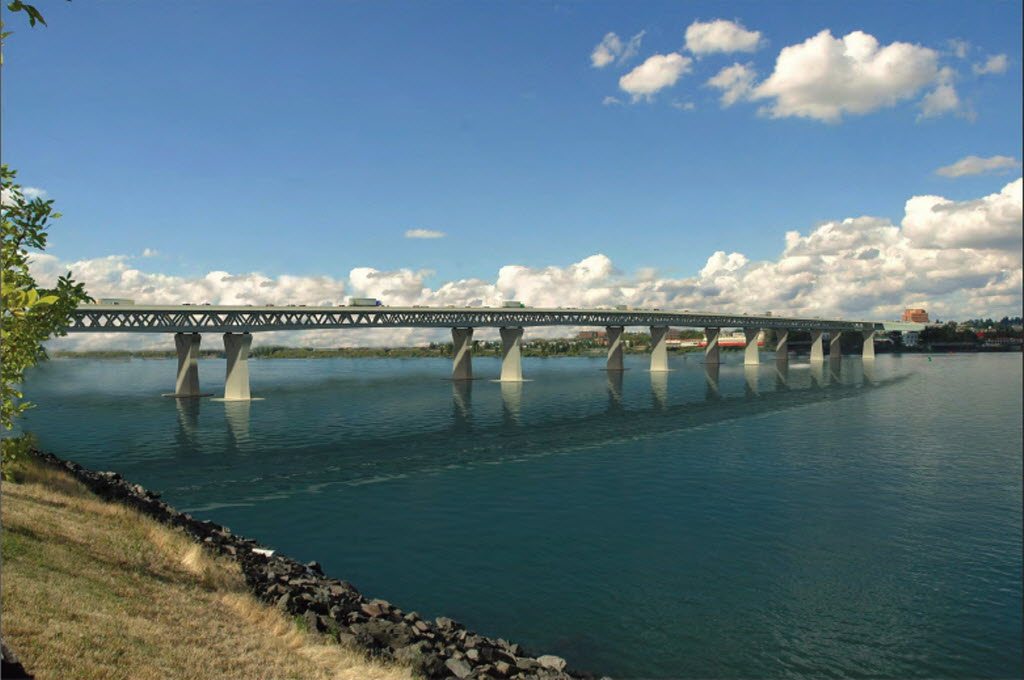PORTLAND — Despite the pleas of the vast majority of the audience, Oregon’s Metro regional government approved a resolution Thursday afternoon stating that Columbia River Crossing officials had properly addressed the elected body’s three-year-old concerns about the project.
Metro Council members took a “leap of faith,” as member Barbara Roberts described it, supporting the measure 5-1, despite expressing their own reservations about unresolved questions concerning the project’s financing plan, tolling and how the project’s construction impact would be mitigated.
The Metro Council made its vote after listening to more than an hour of audience testimony. Most of the 37 speakers urged them to reject the resolution based on financial, environmental or planning concerns with the project.
The CRC would reduce severe congestion on a five-mile stretch of Interstate 5 between Portland and Vancouver by replacing the existing bridge, extending light rail to Vancouver and enhancing pedestrian and bicycle paths, project officials say.
Proponents say the wide-scale changes will make work commutes and freight movement quicker, reduce traffic collisions and provide more jobs thanks to improved access to highways and ports.
The affirmative vote of the Joint Policy Advisory Committee on Transportation, which acted Thursday morning, moved the CRC’s planning stage one step closer to becoming finalized. The Metro Council is expected to hold a hearing in the fall once the CRC’s Environmental Impact Statement is released. That report is needed to begin final design and property acquisition. Construction could begin in 2013.
Before audience members commented on the resolution, Andy Cotugno, the chief land-use planner for Metro, submitted a presentation containing the council’s 11 concerns in 2008.
Among the concerns, five were listed as “resolved.”
They were number of auxiliary lanes; capacity considerations, induced demand and greenhouse gases; preservation of freight access; light rail; and bridge design.
Still, six fell under the category of “on track, but requires additional actions/decisions.”
They were tolling; impact mitigation and community enhancement; demand management; financing plan; design of bicycle and pedestrian facilities; and urban development impacts at redesigned interchanges.
“Even though I don’t have all the answers in front of me today, I expect them to come,” Roberts said to the audible dismay of some audience members.
In explaining their approval votes, Metro Council President Tom Hughes and Councilor Shirley Craddick said they did not believe all of the items could be properly addressed until the project moves forward.
“Some of these answers will come to fruition when we make the next step,” Craddick said, noting she was not entirely comfortable with her approval vote.
The need to not delay the project any longer, particularly since it has already cost taxpayers more than $130 million, also influenced councilors’ votes, they said.
Fellow Metro Councilor Carl Hosticka was the lone councilor to oppose the resolution. He disagreed with the notion that CRC officials would eventually draw up a plan after failing to answer all of the Metro Council’s questions in three years.
“Given the fact they don’t have a detailed finance plan, or the prospect of a finance plan, I don’t think I can support the resolution,” Hosticka said.
Audience members were called before the council in groups of three. Each speaker received one minute, although the time limit was usually extended by a few seconds.
Former Metro president candidate Bob Stacey told the councilors, “Many of us believe we can’t build our way out of congestion.”
He also questioned the wisdom of having an interstate with 10 lanes and tolls. Such a combo could become a “white elephant,” he said.
At least two-dozen speakers shared Stacey’s opposition. For most, the rationale stemmed over concerns that CRC officials had not properly studied facets of the project. Councilors responded to this by pointing to a variety of independent studies performed to answer such questions.
A handful of residents from Hayden Island, which is on the Oregon side of the bridge, urged councilors to push the CRC project forward.
“We need that bridge to make sure our people can get on and off the island, especially during emergencies,” said Pam Ferguson, president of the Homeowners Association in Hayden Island. “It’s imperative.”
The meeting only featured a handful of people who identified themselves as being from Vancouver. They offered differing opinions.
“This is being shoved down our throats by this side of the river, and we don’t appreciate it,” Josephine Wentzel said.
A young man from Vancouver, whose name was not immediately available, supported the project, he said, because it was integral for the region’s future. He noted all the focus on slight imperfections in the plan were “misplaced.”
Metro Councilor Rex Burkholder promised Thursday’s meeting would not be the last time many of those present visited the Metro chambers to discuss the CRC.
“It will be back again and again,” he said. “We will see you again.”
Ray Legendre: 360-735-4517, ray.legendre@columbian.com//www.twitter.com/col_smallcities//www.facebook.com/raylegend



